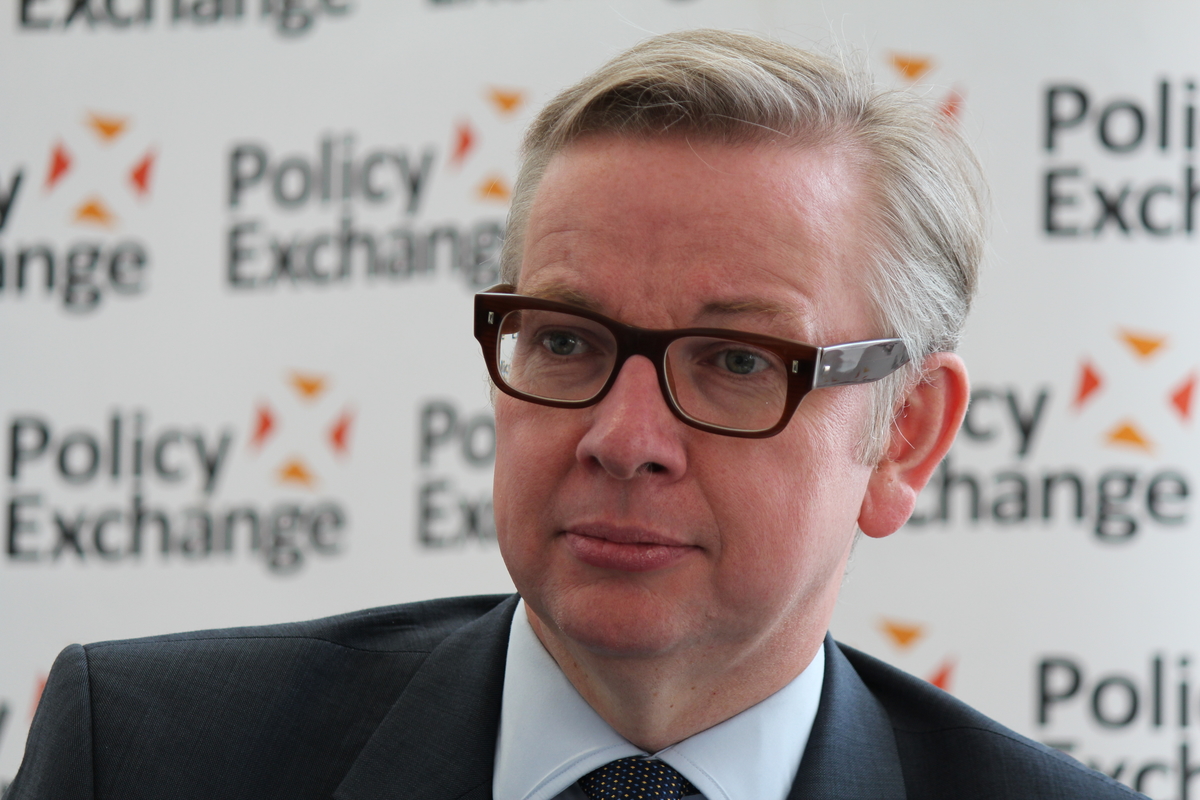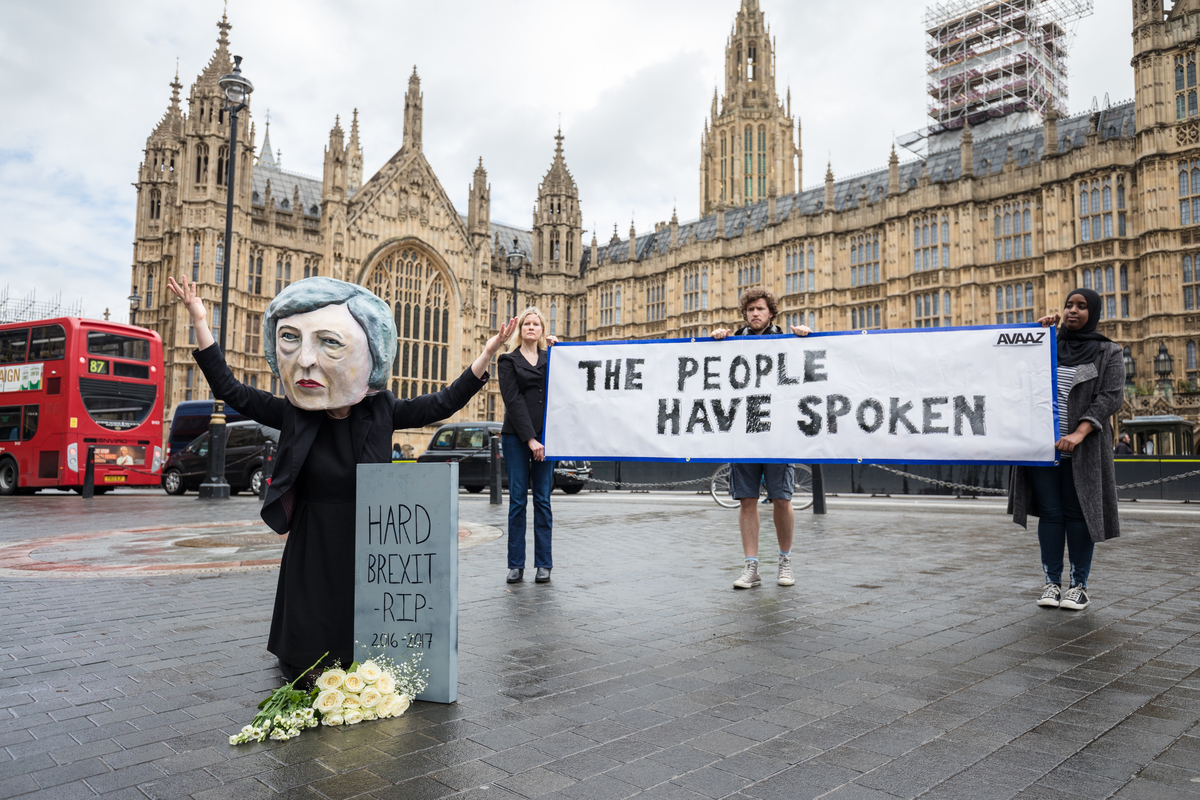On June 23 2016, 46 million voters merrily skipped to the polls to have their say about whether the UK should remain in the European Union. Early the following morning, it was revealed that 52 percent of the population had voted Leave.
Most were shocked, a small majority were joyous, the rest were dismayed — including many who were concerned Brexit would mean the UK’s climate policy and environmental regulation coming under attack.
One year on, the negotiations have formally started and things have progressed… a bit.
DeSmog UK looks back a tumultuous 12 months where Brexit has dominated the political agenda, and try to untangle what it means for the UK’s prospects of tackling climate change.
Cutting ‘Green’ Tape
Campaigners had warned before the referendum that a vote to leave the EU put the UK’s environmental regulations at risk. The volume of those warnings only increased once the result was in.
DeSmog UK analysis suggested Brexit’s cost to the UK’s environmental programmes could be in the ballpark of £40 billion (and it really is a very big ballpark, even at this stage, with countless unknowns).
Theresa May did little to calm nerves when one of her first decisions on stepping into Downing Street after David Cameron’s post-referendum resignation was to scrap the Department for Energy and Climate Change (DECC). Rumour had it that the decision was prompted by one of May’s special advisors, Nick Timothy, who had famously once called the Climate Change Act a “monstrous act of self-harm”.
The department was duly folded into the new Department for Business, Energy and Industrial Strategy (BEIS). After the initial task of deciding how to pronounce the acronym was sorted — somewhere between “baize” and “base”, apparently — the new climate minister, Nick Hurd could set about defending the government’s increasingly patchy climate policy record.
Hurd told MP’s that while Brexit and Donald Trump’s US presidential electoral victory added “complexity” to the UK’s efforts, neither would ultimately stop the government delivering its emissions reduction plans.
Likewise, the government’s 77-page Brexit plan suggested the UK remained committed to tackling climate change, though it didn’t actually say how.
Like Timothy, who was unapologetically sacrificed after the Tories’ disastrous showing in the recent snap election, Hurd is no longer in his post. He has been replaced in BEIS by Claire Perry, though the department’s boss — secretary of state Greg Clark — remains in place.
While the government spent 12 months putting a brave face on things, experts took to parliamentary committees to suggest the situation may actually be pretty bad.
They cautioned that Brexit should not become a “catch-all excuse” to bend to the will of polluting industries, and warned of the potential “enormous gap” in the UK’s environmental policy once the UK’s exit from the EU was complete.
As the UK’s snap election loomed, Labour were keen to continue to emphasise this point, arguing that the Tories were looking to use Brexit as a “vehicle for deregulation”.
Defra minister Therese Coffey confirmed that European environmental regulations would not be subject to the government’s “one in, two out” regulatory rule when being copied across as part of the Great Repeal Bill, however.
And New environment secretary and arch-Brexiteer Michael Gove sought to offer further reassurances in recent weeks, saying Brexit could actually increase the stringency of some regulations — sounding unexpectedly like the Green Party in the process.
His words have been met with skepticism, however — which perhaps isn’t surprising since not long ago he tried to remove climate change from the geography national curriculum and barred then climate secretary Amber Rudd from attending the 2014 UN climate talks.
The deregulation agenda has also come under attack in the wake of the Grenfell tower tragedy that was partially attributed to the use of undetected illegal cladding, perhaps further discouraging those that want to further cut environmental red tape.
New environment secretary Michael Gove at a talk for thinktank Policy Exchange. Credit: Policy Exchange CC BY 2.0
Rejecting ‘Hard’ Brexit
Theresa May’s desire to bolster support for her vision of a “hard” Brexit, combined with polls that suggested she would win easily, led her to announce a snap general election she’d promised not to call.
It didn’t go well.
May returned to parliament having lost the Conservatives’ majority in the House of Commons. She is now locked in negotiations with Northern Ireland’s hard-line socially conservative Democratic Unionist Party (DUP).
The good news for May is that the DUP is pro-Brexit. The bad news for everyone is that they have known climate science deniers among their ranks, one of whom was previously Northern Ireland’s environment secretary.
In the run up to the election, the Tories were the only party to back fracking, and stood on a platform of keeping the North Sea’s oil and gas drilling industry alive.
Given the only mention of climate change in the Queen’s speech — which lays out the government’s legislative agenda for the year ahead — was a reaffirmation to stick with the Paris Agreement, it’s unclear how much of its manifesto the Conservatives are actually planning to try and implement.
But as the DUP and Tories are aligned on a more hard-line Brexit, it seems the government will likely try and stick to the Conservative’s manifesto pledge to construct energy policy “based not on the way energy is generated but on the ends we desire – reliable and affordable energy, seizing the industrial opportunity that new technology presents and meeting our global commitments on climate change”.
Avaaz campaigners demonstrate outside parliament after the UK‘s snap general election. Credit: Avaaz CC0 1.0
Strengthening Dodgy Networks
By managing to so spectacularly lose an election she actually won, Theresa May has inadvertently strengthened the hands of a number of key figures embroiled in a trans-atlantic Brexiteer climate science denier network, previously mapped by DeSmog UK.
Michael Gove is back in the cabinet as environment secretary. He is linked to the network through his friendship with far-right Breitbart journalist James Delingpole and former chancellor Nigel Lawson, the founder of the climate science denying campaign group, the Global Warming Policy Foundation (GWPF).
Another cabinet member pushing for a hard Brexit is Liam Fox, who keeps his post as trade secretary. He just so happens to be a close ally of the shady libertarian free-market US think tank partially credited with delivering Trump to the White House, the Heritage Foundation. In a show of Fox’s new found influence, he this week managed to get the government to commit to a new trade bill that means the UK can break free from EU restrictions.
May has decided to keep Boris Johnson as foreign secretary — partly to keep him out the way, and partly because she had little power to demote him — and he is publically offering his steadfast support. Many commentators still see him as a future Tory leader, however.
Johnson has a very patchy grasp of climate science, and has previously received donations from GWPF funder, Michael Hintze (who also donated to Vote Leave).
Andrea Leadsom also remains in the cabinet, though in a new post as leader of the House of Commons. Leadsom has received donations in the past from climate science denial enablers the American Legislative Council (ALEC) and was on the campaign committee of Vote Leave.
Beyond the cabinet, Donald Trump’s golden elevator buddy Nigel Farage is also considering a return to the frontline of British politics, supposedly because he’s concerned the prime minister is now too weak to conduct Brexit properly. Farage isn’t convinced climate change is a problem, which given his penchant for political interventions remains something of a problem itself.
The Conservatives’ imminent pact with the DUP has also strengthened the network’s bonds to Theresa May.
DUP MP Sammy Wilson is a well known climate science denier who regularly books rooms in the House of Commons for other members of the network. That includes a number of MPs who signed two open letters: one calling on the government to scrap the fifth carbon budget, and the other complaining of the BBC’s “biased” coverage of the Brexit referendum.
So, what’s the state of play one year on?
The UK’s environmental regulations are still under threat, fracking and fossil fuels remain stubbornly on the government’s agenda, and a group of fringe climate science deniers have seen their influence grow as the prime minister’s hand has been weakened.
And the Brexit process has only just begun.
View this map on LittleSis
Main image credit: Jonathan Rolande via Flickr CC BY 2.0
Subscribe to our newsletter
Stay up to date with DeSmog news and alerts








